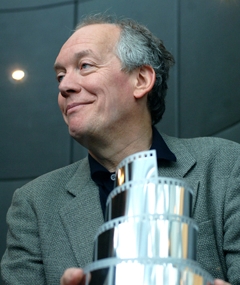| Dardenne, Luc
 |
Date of birth
10 March 1954, Liège, Belgium
Mini biography
Luc Dardenne (10 March 1954, Liège, Belgium)
Characterizing themselves as “one person with four eyes,” Belgian filmmaker Luc Dardenne and his older brother Jean-Pierre rose to the forefront of international art cinema in the 1990s with such uncompromising, socially aware dramas as La Promesse (1996) and Rosetta (1999), depicting life in Belgium’s depressed industrial region near Liège on the Meuse River.
Born in Awirs, Dardenne grew up in a middle-class family in the working-class steel town Seraing. With schools closed during strikes, Dardenne was exposed to the upheavals of the 1960s labor movement during his formative years.
While still in school, Dardenne frequently visited his older sibling in Brussels, where Jean-Pierre was studying acting under playwright Armand Gatti.
“Of course, we always hope our films will speak to people, disturb them, but we never hoped to change the world”.
Gatti, who often used nonprofessional actors, invited Luc to join his acting troupe. Though he got his degree in philosophy in the early ’70s, Luc was inspired by his time with Gatti to explore the creative and political possibilities of film and video with his brother.
Aiming to chronicle the social changes happening around them, Luc and Jean-Pierre returned to their home region and worked for several months in a cement factory to earn money for video equipment.
Filming such events as strikes and union meetings over a period of several years beginning in 1974, the Dardennes’ first videos d’intervention documented the effects of Liège’s severe recession in the early ‘70s.
Intent on preserving Belgium’s history of social activism and exposing that history to a new generation, the Dardennes formed the production company Dérives in 1975 to make documentaries for Belgian television. Using such “theatrical” techniques as filming their historical witnesses in dramatic settings, the Dardennes essayed such topics as the Nazi resistance in Belgium’s southern Walloon region in Le Chant du Rossignol (1978) and the history of emigrations from Poland in Leçons d’une Université Volante (1981).
Despite their success with documentaries, the Dardennes decided to move beyond the limits of nonfiction into the narrative freedom of fiction films in the mid-‘80s with their first feature, Falsch (1986).
Though Falsch and the Dardennes’ subsequent dramatic feature, Je Pense à Vous (1992), garnered some positive response at such esteemed film festivals as the Berlin Film Festival and Cannes Film Festival, they did not succeed in gaining a wider release beyond Europe and the festival circuit.
While his brother remained in Liège, Luc relocated to Brussels, where he began teaching classes on aesthetics and screenwriting at the Université Libre in 1990.
Undeterred by the results of their initial efforts, and keeping their artistic base of operations in Liège even after Luc moved away, the Dardennes formed another production company, Les Films du Fleuve, in 1994 to make fiction features. Their persistence paid off with their internationally acclaimed third drama, La Promesse. Shot on-location, La Promesse’s intimate, hand-held visual style revealed the punishing conditions for immigrants forced to work illegally through the searing personal story of a son forced to choose between his morally corrupt father and keeping the eponymous vow he made to one of his father’s dying employees. Garnering accolades on the film-festival circuit, La Promesse earned more raves and awards as an international art-house release, including the Best Foreign Film prizes from the Los Angeles Film Critics Association and the National Society of Film Critics.
Maintaining their unstinting focus on the perils of unemployment, the Dardennes followed La Promesse with the equally tough drama Rosetta (1999). Described by the Dardennes as a “war film,” Rosetta depicted the title girl’s intense personal fight to find a sense of normal life through getting a job at all costs. Shot in hand-held, claustrophobic long takes relentlessly detailing the rituals and failures shaping Rosetta’s existence, the Dardennes reveal the psychic pain and numbness that become exacerbated in Rosetta’s battle against a world that wants nothing to do with its outcasts. Anchored by newcomer Emilie Dequenne’s brave, unsympathetic performance as the tormented, near-feral Rosetta, Rosetta won Cannes’ Palme d’Or and Best Actress prizes.
Refusing such blandishments as bigger budgets and star casts after their international success, the Dardennes preferred to keep the freedom to make their harsh stories about working-class lives by sticking with their low-cost creative endeavors in Liège. In their next film, The Son (2002), the Dardennes turned their gaze on a man forced to come to terms with the sin committed by one of his carpentry students. Often shooting star Olivier Gourmet from the rear, the Dardennes keep the reasons for Gourmet’s inchoate hostility toward his new charge a mystery, before revealing a past murder that intensifies the suspense about how this relationship will be resolved. Another critical and art-house favorite, The Son continued the Dardennes’ winning streak at Cannes with the Best Actor prize for Dardenne regular Gourmet. --allmovie guide
Director - Selected filmography
-
The Kid with a Bike - Le gamin au vélo (2011)
-
Lorna's Silence - Le silence de Lorna (2008)
-
L'enfant (2005)
-
The Son - Le fils (2002)
-
Rosetta (1999)
-
The Promise | La promesse (1996)
|

